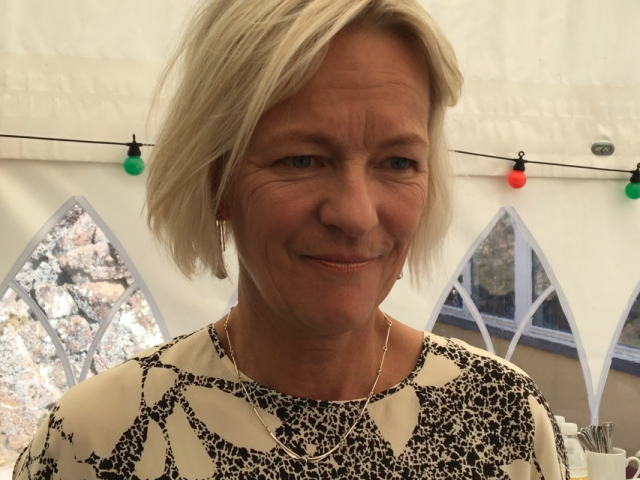Global outreach has made CBS’ Boardroom Programs among the best in the world

(Illustration: Shutterstock)
Engagement in global projects like the Global Board Leadership Summit, which comes to CBS in September, is one of the reasons why CBS’ Board Education has continued to grow in popularity since it started in 2013. Furthermore, about 40 percent of the participants of the board programs are women who become qualified to take up boardroom positions.
Did you know that CEOs, managers, directors, board members and boardroom leaders from all kinds of companies and organizations in Denmark come to CBS to boost their boardroom skills?
Since 2013, the number of participants attending one of CBS’ many board programs have increased almost tenfold. In 2018, 612 board leaders and senior executives attended a CBS board program.
“Today, most of the large Danish corporations, institutional investors, and industrial associations support the CBS board initiative and come to CBS regularly – as faculty and as participants. here. This counts also organizations such as University of Copenhagen and ATP, the biggest pension and investment fund, have been through our program,” says Tom Jacobsgaard, the Executive Director of the CBS Board Education and the CEO of the Board Leadership Society of Denmark when I meet him at Porcelænshaven.
Together with two leading CBS professors and 14 boardroom leaders from Denmark, he just returned from Singapore where they have been part of co-hosting the Global Board Leadership Summit, which took place January 9-10.
“CBS is in the top three of the best board programs in the world, and a part of that is because of the global outreach. If you don’t have global ambitions, you can forget about being among the best. It simply makes us better, when we can work together and challenge ourselves in working together with other leading corporate governance environments like Singapore and Stanford,” he says.
The summit works as a platform for global dialogue, which brings together boardroom leaders hand-picked from all over the world to inspire and lead discussions on topics such as strategy, succession, sustainability, risk governance and crisis management, and digitalization. And this September, it will be held at Copenhagen Business School and in 2020 at Stanford, in Singapore once again and in Munich.
The better the board, the better the company
The CBS Board Education at CBS turns six this year, and was established in 2013 by the Board Leadership Society of Denmark. It was founded by 10 professors, of whom nine are from CBS, eight companies and 24 board chairs.
“You can’t develop boardroom leadership without the boardroom leaders themselves. So to make this work, we needed support from Danish companies and their board leaders,” says Tom Jacobsgaard.
At the time the CBS board initiative was established “there was no serious educational activities to offer boardroom leaders and certainly there was no focus on development of a board leadership discipline,” as Tom Jacobsgaard describes it.
The new CBS Board Education closed a gap and created a missing link between research-based teaching and the practical world’s experiences from boardrooms.
“The better the board understands its role and the obligation to put the interest of the company first, the more value creation to enjoy for the coporation, the shareholders and stakeholders, and society as such,” he says.
In the wake of the CumEx scandal and the plenty money laundering-cases, corporate boards should consider their position as to societal responsibility
Tom Jacobsgaard
This coming Saturday, January 19, 49 participants of the CBS Executive Boardroom Leadership Program will complete their exam, which consist of a written exam and simulating a board meeting in companies like Brøndby IF, Flügger and TDC. Eight participants will form the board and conduct the meetings that are webcasted to an auditorium where four external examiners watch and evaluate the performance of the board alongside their fellow students.
“Today, we are leading the way with our teaching method that is based on real-life cases and faculty compostion with professors and board leaders. We never compromise on relevance and quality,” says Tom Jacobsgaard.
Putting together the best board requires diversity
At the Global Board Leadership Summit, the participants discussed new ideas and solutions to the opportunities, challenges and risks that face global corporations today. But what are the most important topics that the boards should discuss to make companies prosperous in the future?
“Corporate boards have to consider the UN’s Goals for Sustainable Development, and how they want to engage with their shareholders and stakeholders in deciding the route for their company in addressing these major world challenges. Also, in the wake of the CumEx scandal and the plenty money laundering-cases, corporate boards should consider their position as to societal responsibility,” says Tom Jacobsgaard.
Another important issue that Tom Jacobsgaard points out is diversity.
“Diversity plays a significant and growing role in terms of putting together a board with the right people with the right competencies. Diversity is about competences, experiences, personalities, but certainly so also about gender, ethnicity and age. If a board wants to be on top of digitalization and social media, they should consider having younger board members, as they can contribute with hands on experience and new knowledge,” he says and continues:
“However, learning 35-year-olds to consider boardroom work with hours of boring compliance check-the-box exercises is challenging, and to learn these people to understand governance and the role of boards is even more challenging so.”
The President of CBS, Per Holten-Andersen has in his time been very engaged in the work and debate on how to get more women in leadership positions – including becoming boardroom leaders. CBS Board Education programs has a role providing talented women the skillset to take up board positions, says Tom Jacobsgaard.
“On an average, 35 to 40 percentage of the participants in the board classes are female executives and board members. I am sure this reflects the overall trend of increasing diversity on corporate boards.”
Know-it-alls don’t know it all
CBS Board Education has seven different programs, which run several times a year. But why do boardroom leaders even need further education? Isn’t knowledge from your own field enough?
“Can you imagine any other job of importance today where you do not need to further educate yourself and update your knowledge and get new inspiration on a continuous basis?” asks Tom Jacobsgaard and continues:
“You see – no you can’t. That counts for board work too. You can’t go around thinking that you’re a know-it-all. You have to read a lot about the industry, digitalization, new laws and so on. You can’t be in a board without gaining new knowledge and challenge your practice.”




































































































































Comments